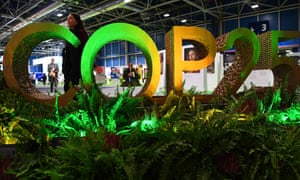https://www.theguardian.com/environment/2019/dec/04/paris-climate-deal-world-not-on-track-to-meet-goal-amid-continuous-emissions?fbclid=IwAR1ltqoWnPidT-vJMxw0Q269AlB0hk9Sdc929Pw8RCX9SMSRn75MR4zwHAI
Paris climate deal: world not on track to meet goal amid continuous emissions
Slowdown this year in rising greenhouse gases does not negate long-term trend, finds carbon budget analysis
Carbon dioxide emissions rose weakly this year as the use of coal declined but natural gas took up the slack, a comprehensive study of the global “carbon budget” has found.
The rise in emissions was much smaller than in the last two years, but the continued increase means the world is still far from being on track to meet the goals of the Paris agreement on climate change, which would require emissions to peak then fall rapidly to reach net-zero by mid-century.
Emissions for this year will be 4% higher than those in 2015, when the Paris agreement was signed. Governments are meeting this week and next in Madrid to hammer out some of the final details for implementing the Paris deal and start work on new commitments to cut emissions by 2030. But the new report shows the increasing difficulty of that task.
Experts said it was much too early to take the slight slowdown in emissions growth this year as a sign the world was turning a corner in the climate emergency.
Joeri Rogelj, a lecturer in climate change at the Grantham Institute, Imperial College London, said: “CO2 emissions wiggle from year to year, but it is the long-term trend that is important. The small slowdown this year is really nothing to be overly enthusiastic about. If no structural change underlies this slowdown, science tells us that emissions will simply gradually continue to increase on average.”
Such structural changes could include investment in renewable energy, low-carbon infrastructure, and plans to make buildings more energy efficient. “As long as global CO2 emissions are not embarking on a clear downward trajectory it is clear that we are not only continuing to make climate change worse, we’re doing it at a pace faster than ever before,” said Rogelj.
Last week, a separate report found emissions would have to fall by 7.6% a year for the next 10 years to stay within the limits advised by scientists.
Corinne Le Quéré, a research professor at the University of East Anglia who contributed to the Global Carbon Budget analysis, called for stronger policies from governments to phase out fossil fuels.
“Current climate and energy policies are too weak to reverse trends in global emissions,” she said. “Policies have been successful to varying degrees in deploying low-carbon technologies, such as solar and wind power and electric vehicles. But these often add to existing demand for energy rather than displacing technologies that emit CO2, particularly in countries where energy demand is growing.”
Emissions from coal burning dropped by about a 10th in the US and Europe, but oil use rose by about 0.9% and gas burning by about 2.6% globally.
Glen Peters, research director at the Cicero Centre for International Climate Change Research and lead author of the Global Carbon Budget papers, which are published in the journals Nature Climate Change, Environmental Research Letters, and Earth System Science Data, said: “The weak growth in carbon dioxide emissions in 2019 was due to an unexpected decline in global coal use, but this drop was insufficient to overcome the robust growth in natural gas and oil consumption.”
While coal use has declined in the US and Europe, new coal-fired power stations are still being planned in China, India and other countries; developed countries such as Japan are funding their construction overseas.
Carbon from the burning of fossil fuels, from industrial processes and from cement manufacture increased by 0.6% in 2019, according to the provisional figures for the year. It was much slower growth than in recent years but still represented an increase.
Emissions fell year-on-year by about 1.7% in the US and EU, but rose in China, the world’s biggest emitter, as well as in India and most of the rest of the world.
Taken over the last 10 years, emissions have grown by an average of 0.9% a year. That is an improvement on the 3% a year that was the average for the 2000s, and emissions fell during the aftermath of the 2008 financial crisis, and reached a brief plateau from 2014 to 2016.
However, broadly the pattern has still been an increase. In 2017, emissions grew by 1.5% and in 2018 by 2.1%.
European leaders will make a fresh push to agree a target for a climate neutral EU by 2050, a leaked document has shown. The EU failed to agree an EU-wide 2050 target last June, after Poland, Hungary, the Czech Republic and Estonia refused to join 24 countries in making the pledge. Estonia has since come on board, but the three other governments have not publicly agreed to the target, although officials hope they will agree, in exchange for funding in the next EU budget to help “green” their economies.
The leaked council conclusions, seen by the Guardian, have been drafted ahead of an EU leaders’ summit next week. The document, which could change, also calls on the European commission to propose a revised EU climate target for 2030. The EU currently aims to reduce greenhouse gas emissions by 40% by 2030 (compared with 1990 levels), which campaigners say is woefully inadequate. Last week the European parliament called for a target of a 55% cut when it declared a climate emergency.

沒有留言:
張貼留言